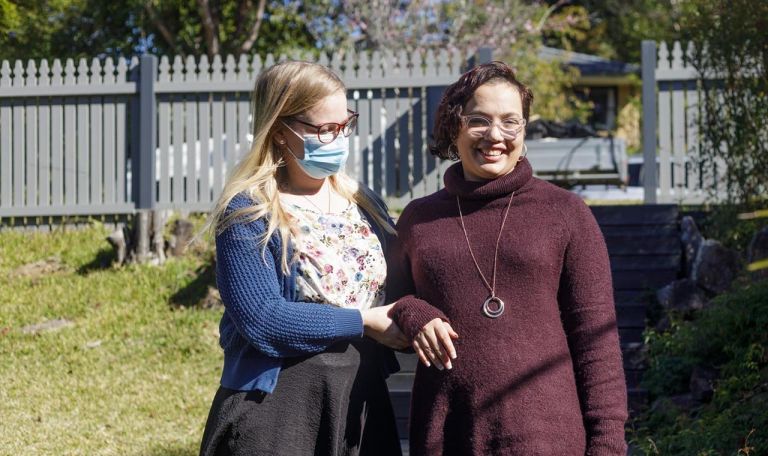Simple steps to protect yourself
Speak to your doctor before you get sick
Understand what test to do when you feel unwell
Check if you're eligible for antivirals
Stay up to date with your recommended vaccinations
Staying safe
Some people with disability are at a higher risk of severe illness from COVID-19.
Speak to your doctor about which COVID-19 test is right for you before you get sick.
Ask your doctor before you get sick and ask them to complete a pre-assessment action plan for respiratory infections. This form helps you know what test to do and if you may be eligible for antiviral medicines or other treatments for COVID-19 if you test positive.
Antiviral medicines work best when taken as soon as possible, usually within 5 days from when your symptoms start.
Vaccinations for people with disability
Stay up to date with recommended COVID-19 vaccinations to help protect yourself.
You may be eligible to get an additional COVID-19 vaccination. For more information, visit Booster vaccination or talk to your doctor, Aboriginal Medical Service, or vaccination provider, about your needs and your vaccination options.
Vaccinations for disability support workers
NSW Health strongly encourages people providing care to people with disability to stay up to date with all recommended vaccinations – including COVID-19 and influenza – to protect against severe disease for themselves and the people they care for.
Find out if you are recommended to get an additional COVID-19 vaccination.
Getting tested for COVID-19
If you have COVID-19 symptoms (runny nose, sore throat, cough or fever), contact your doctor for testing advice.
If you can't contact your doctor, call Healthdirect on 1800 022 222 or use the online Service Finder to find a doctor near you.
If your doctor recommends a COVID-19 PCR test, they will give you a pathology referral form for a free COVID-19 PCR test.
The referral form will have a private pathology provider location on it which you will need to visit so you can get tested.
For more information, visit What COVID-19 test should I do?
For more information if you test positive to COVID-19, visit Testing positive to COVID-19 and managing COVID-19 safely at home.
COVID-19 antiviral medicines
Antiviral medicines target the virus that causes COVID-19, to help stop it from infecting healthy cells in your body and multiplying. This means you are less likely to get very sick and go to hospital.
If you get COVID-19 you might be able to get antiviral medicines. Talk to your doctor now about antiviral medicines to find out if you are eligible and if they are right for you.
Antivirals work best when taken as soon as possible – usually within 5 days from when your symptoms start.
If you can't speak to your doctor, contact healthdirect on 1800 022 222.
If you have been exposed to someone who has COVID-19
If you live with or have spent a long time with someone who has COVID-19, you are at increased risk of getting COVID-19.
Monitor for symptoms (such as a runny nose, sore throat, fever, cough). If you get sick, NSW Health recommends that you get tested and stay home until your symptoms have gone away.
See Advice for people exposed to COVID-19 for more information.
General advice to avoid COVID-19
Ways to help reduce your risk of COVID-19:
- Stay up to date with your recommended COVID-19 vaccinations.
- Get together outdoors or in large, well-ventilated spaces with open doors and windows. If possible, ask friends and family to take a rapid antigen test before gathering.
- Avoid crowded spaces.
- Practice good hand hygiene, including regular handwashing.
Visiting people in aged or disability care
We all need to take steps to keep people who are at higher risk of severe illness from COVID-19 safe.
If you have friends or family members who live in aged or disability care, you can help them by:
- contacting the residential care facility before you visit to check if there are any current entry restrictions or arrangements and also check NSW Health advice for residential aged care facilities or NSW Health advice for residential disability care facilities
- staying in touch, but not visiting them if you are unwell
- doing a rapid antigen test before you visit, if possible
- meeting outdoors or in large, well-ventilated spaces, when possible, with open doors and windows.
Read more about visiting people in aged care or disability care.
For people with vision impairment
Resources for people with vision impairment or blindness.
- Information on coronavirus (COVID-19) - Blind Citizens Australia
- COVID-19 safety guidelines - information from Vision Australia about important changes to help you stay safe and connected.
Resources for carers
If you are supporting and caring for someone with disability, there are resources to keep informed about COVID-19, the rules and tips for staying healthy.
- NDIS carer and participant information (NDIS)
- Information for people with disability and their supporters (Australian Department of Social Services)




